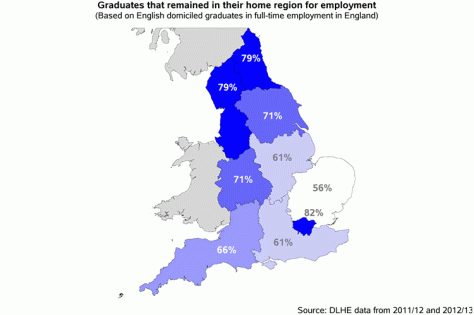The UniverCities report from the City Growth Commission that came out this week has a number of interesting things to say about graduate retention and migration.
(The authors kindly asked for my views and I am credited in the report).
The report rightly recognises the important part universities play in local economies – although it may have been worth stressing their important to retention as employers of labour as well as suppliers. In most UK metropolitan areas, the local universities will be one of the three largest employers of graduates (the NHS usually being the largest, and HE the second largest).
As a rough – but reasonably accurate – generalisation, graduates will do one of three things when they graduate, in this approximate order.
- They will return to their home domicile, or close to it (often within a travel-to-work area)
- They will stay near their institution of study, or close to it (likewise within a travel-to-work area)
- They will go to London.
The likelihood of going to London varies with distance of domicile from the capital – a graduate originally from Essex is more likely than a graduate from Cumbria to go to London – and also the distance of their institution from London.
An illustration of this comes from the student mobility data recently produced by HEFCE as part of their ‘hot-spots’ data release (I thoroughly recommend having a good look at the information at that link). Note that regions closer to London retain fewer home-domiciled graduates.
Image comes from the HEFCE website here:
Graduates are rather unlikely (with certain exceptions) to go to work in a region that’s not near where they were originally domiciled, or where they studied. Certain strong regional jobs markets – Manchester, Birmingham, Leeds, Newcastle and Bristol are good examples in England – do take some graduates, but it’s not as strong an effect as the three examples below. Belfast adds an extra dimension in Northern Ireland; ditto Swansea and Cardiff in Wales. Scotland is complicated.
In short, if we want graduates to concentrate in metro areas, they are going to originally hail from those areas, or have studied in them.
The report says that there is a ‘relative lack of graduates who stay on….in the region that they studied’, which is on one hand a point, but the other begs the question ‘what proportion do we, or should we, reasonably expect to stay?’ It is also true to say that graduates staying in their home region make up a larger proportion of graduates in employment below professional level than they do those entering professional level jobs. This makes sense; graduates who experience difficulty in the jobs market might be expected to return home. So we need not just to consider how many graduates stay, but what they’re doing when they do stay and the wider effects of them staying in regions they studied.
This last point is something that has been brought home by discussion with the reliably-interesting Rosie Alexander. She covers the University of the Highlands and Islands, and, of course, communities that are very definitely not metro areas. Assuming that graduates are to stay where they studied, that tends to imply that they will stay there rather than, in many cases, returning home to regions that are outside traditional university centres. Whilst it is in the interest of the metro area (which gains more skilled employees), the graduate (moving to areas where one assumes that they are more likely to find work) and even the institution (graduates getting better work improves their metrics), it may not be in the interests of the original domicile, which loses potential human capital, for this to happen.
But what if you have communities that have the potential to benefit from an increased graduate supply but might not necessarily have a job to offer them right now? Is it reasonable to expect graduates to go to places essentially as a pool of potential labour, but with no promise of a job? (Almost certainly not). But otherwise, how are the skilled economies of these areas to be improved? Should we therefore allow their human capital to flow to urban areas better able to make use of them? These are not altogether easy questions to answer, especially where the perceived public investment in HE and the very real cost to students makes it even harder to justify their economic underutilisation.
These are interesting questions, and this report is a welcome contribution to the debate.

